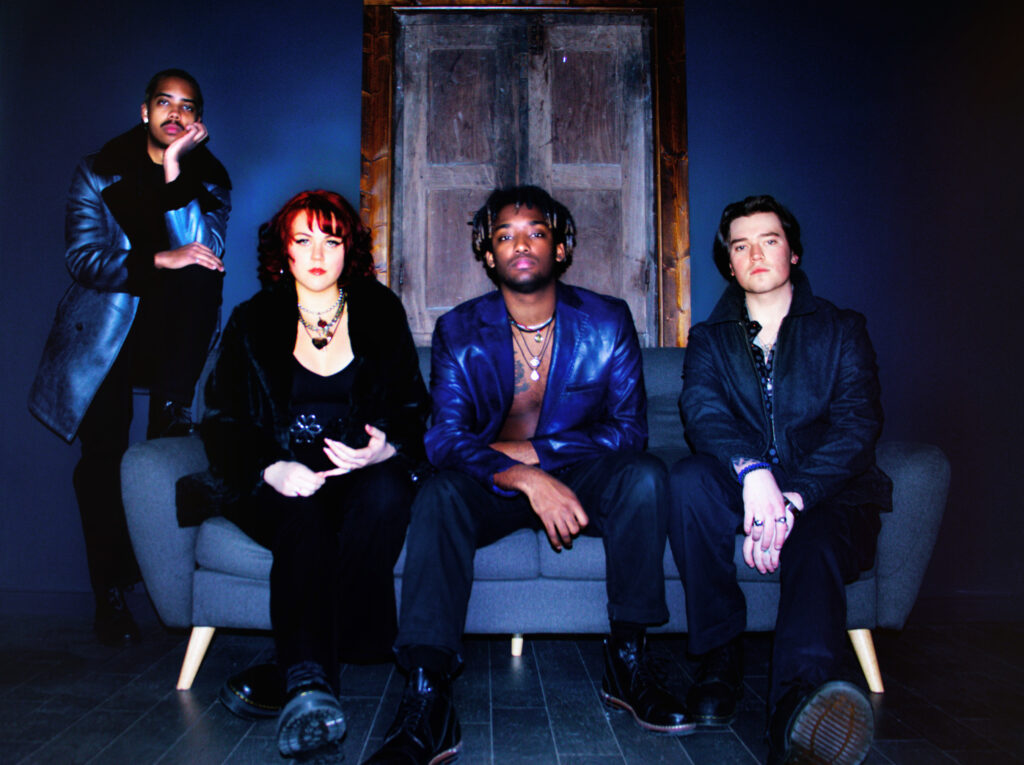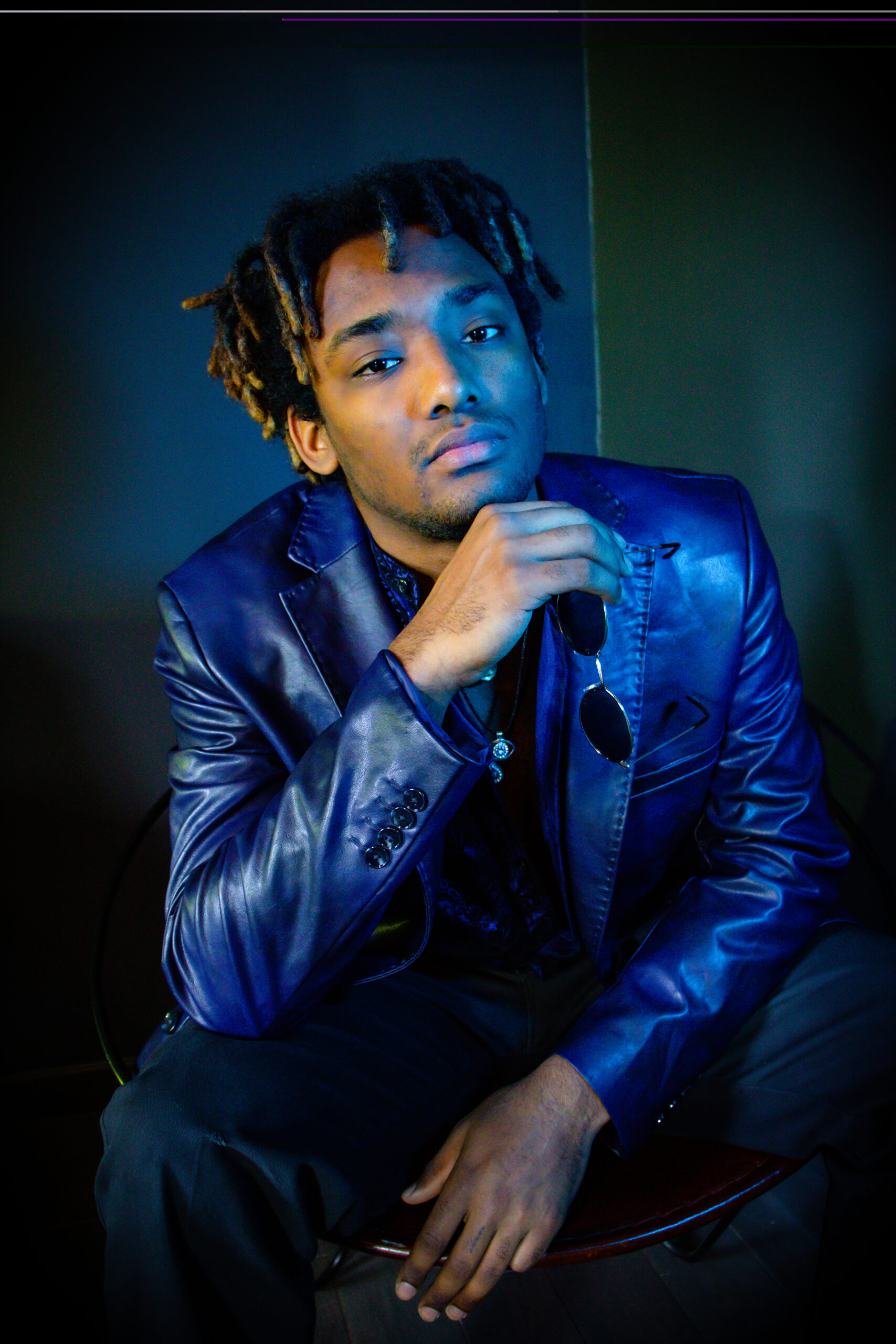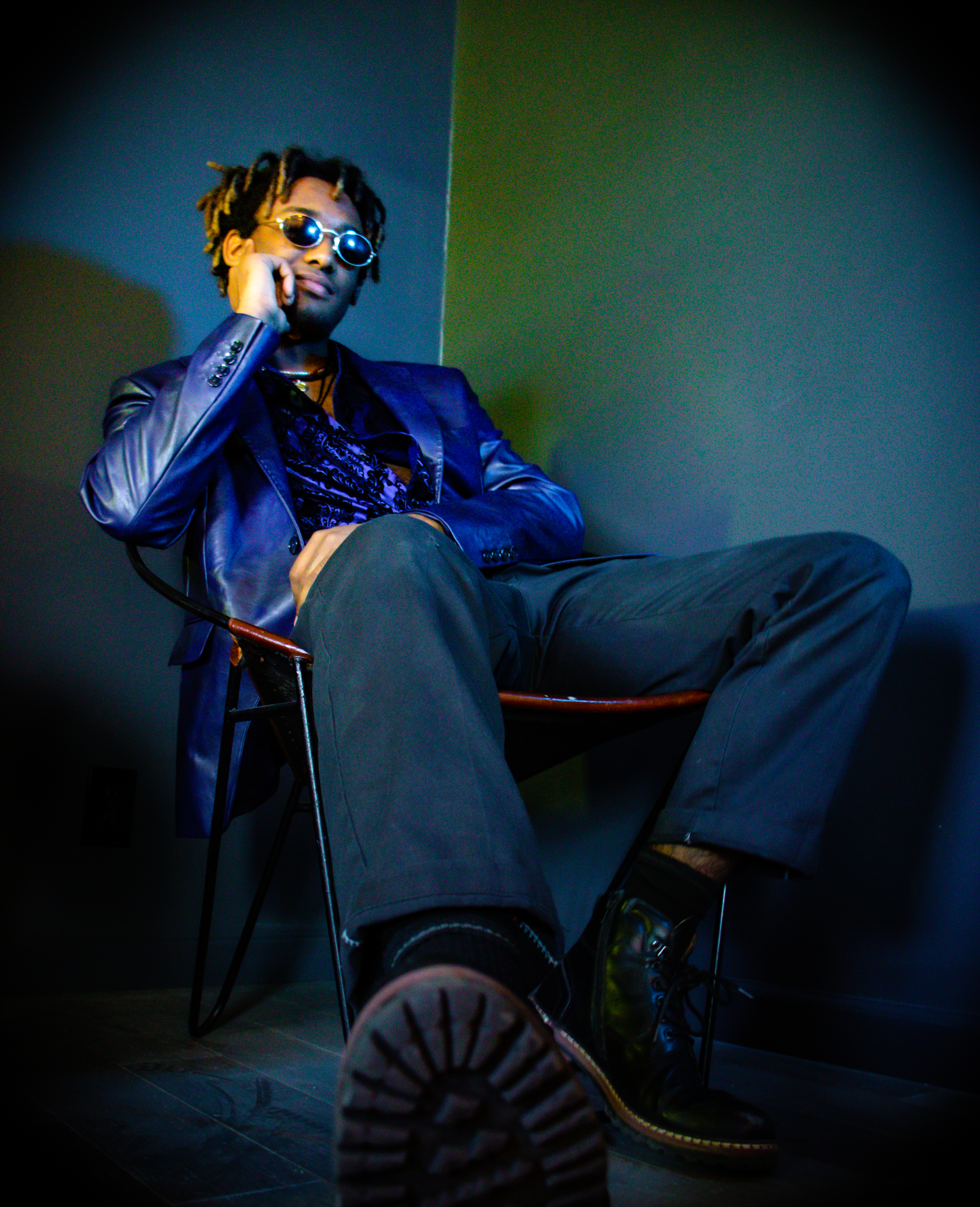Inspired by a dream he had, Bluphoria are a rock n’ roll band originally formed piece-by-piece by singer and guitarist Reign LaFreniere over the period of time that he was attending the University of Oregon. The band hit the ground running, with their popularity swiftly growing on campus and they soon grabbed the attention of EDGEOUT Records. Since then, they have only going from strength to strength.
LaFreniere called in to Post-Burnout from Nashville, where the band are currently based, to discuss their career, their upcoming self-titled debut album, their latest single “Columbia,” opening for Lil Yachty, playing Jimi Hendrix’s guitar, working with GRAMMY Award-winning producer Mark Needham and where they go from there.
_____________________________________________________________________________________________________________________
Yeah, I guess the first thing I’ll just ask is how Bluphoria came to be? My understanding is that you guys formed in Oregon, right, but you are currently based in Nashville?
Yeah. So, Bluphoria has kind of been a long-term project for me. Ever since the end of high school, I’ve kind of had this idea of what Bluphoria was going to be and, going into college, I started jamming with people, and if they wanted to join my band, I was like, “Just so you know, this is going to be Bluphoria.” I kind of had a dream where I saw that name on a billboard and there were four silhouettes, you know, so I want to keep it that way and just see what happens. So, I was doing that for a while, the label got involved, so I needed people who were more label-minded in the band, and I ran into Dakota [Landrum, guitarist] because we were at a house show, and in Oregon, there’s not a lot of black people out there, and he literally walked by me and was like, “Hey! Another black guy!” [Both laugh] And because of that we started talking, and we went to this afterparty and he told me he played guitar, and since then he, you know, started jamming with me and I had him on bass because I already play guitar, so we didn’t need another guitarist yet until we filled out the band. And then, with Rex [Wolf, bassist] – we had a little three-piece going with a friend of ours on drums – and he had actually come to two of our shows in one weekend, and I remember just being in French class, being like, “Oh, I really need a dedicated bassist. I just can’t find a single one out here. Like, what do I do?” and I see this Instagram notification pop up and it says, “Rex Wolf – Musician,” and I was like, “That would be super sick if this guy named Rex Wolf…!” And I click on his Instagram and it’s like bad filters of basses [Both laugh] and just half the feed is like that! So, I was like, “Perfect!” I hit him up, I was like, “Do you want to jam tonight?” He joins the band, same night. And then Dani [Janae, drummer], she actually interviewed me for one of her podcasts, like a music podcast, and she mentioned she played drums, and I was like, “Oh, that’s perfect.” I got her into the scene and like a year later, we needed a new drummer and she had been following us for a while, and she requested to join and so we started jamming with her, and that’s how we all got together. [Laughs]
So, that was all in Oregon, right?
Yeah.
And then when did you move out to Nashville?
So, we moved out to Nashville about six or seven months ago now, mainly because we wanted to be in a better spot with the label and being closer to the music industry and all that. And we had the option, either L.A. or Nashville and, you know, I’m from California so I know what L.A. is like, so I was like, “I’m going to try something new here.” So, yeah, we moved out here.
I’ve talked to people from Nashville and my understanding of the scene there is that it’s very supportive – people aren’t as kind of cutthroat or trying to one-up one another – everyone is very supportive, trying to make sure everyone is in concert, ironically. Is that your experience, I guess?
Yeah. No, it’s one of my favourite parts about this place, is that I’ve never been in a place where there’s musicians and it’s simultaneously, you know, a supportive community because I think most of the time it’s dog-eat-dog and it’s cutthroat and it’s best man for themselves sort of mentality, and definitely on the West Coast that seems to be the general vibe towards, you know, careers and success, but out here it’s been like anything we’ve needed, people are willing to help. There’s not…you know, like, if you’re successful out here, it’s not like you’re a threat to anybody, you know? It’s like everybody’s lifting each other up, which has been really fun and it’s been really cool to be a part of that.
But at the same time, the calibre of musicians out there is just insane, like what people can do. Is that something you kind of go, “Oh, shit! I have to compete with this,” in terms of your own skills, or do you kind of feel like, “This is perfect,” it makes you want to…? I guess what I’m trying to ask is, does it make you want to kind of become a better musician, to hone your skills and not get complacent?
Yeah. Yeah, I mean out in Nashville, the bare minimum is to be talented, so it does help more than it hurts because it’s like you see all these great musicians. Like, I can go to a random show and I can guarantee that I’m going to be blown away by something, and it’s really cool to see that, ‘cause you can bring it into your show, you can start building you repertoire. Like, I once saw this band do this cool breakdown of “Satisfaction” by The Rolling Stones and I was like, “Damn! That was awesome! We should incorporate that sometime,” you know? So, it definitely helps. Like I said, because it’s such a collaborative community, it doesn’t feel intimidating. Like, it feels inspiring most of the time. But yeah.

L-R: Dakota Landrum, Dani Janae, Reign LaFreniere and Rex Wolf
Photo by Jena Yannone. Courtesy of Reybee
You mentioned that you went there for the label, which is EDGEOUT. I was wondering how you got involved with them?
Yeah. So, I had just been playing shows out in Oregon, like I played every single weekend, and this kid one night got a hold of me. I was in my dorm room, it was like eleven o’clock at night, I remember settling in, I was totally done and my roommates came up to me and they’re like, “Hey, man, you gotta come meet this guy,” and I was like, “Really? Do I?” [Laughs] Like, it was like Friday night or something and, you know, I had already, I had come back home, and I was like, “I think I’m good. I think I’m going to stay.” And they kept badgering me about it over and over, and I was like, “Fine, I’ll go with you.” So, we walked to the other side of the town, basically, and we go into this guy’s room and all I remember is like this yoga mat and him and a laptop. [Laughs] And he goes, “I gotta show you something, man” and he shows me EDGEOUT’s website and he’s like, “I’ve been interning for these guys and I want to introduce you to them because I feel like you guys…you know, that’s your speed,” and I was like, “OK, this is cool.” So, he came to one of my house shows and filmed the whole thing and sent it to them and they reached out to me, and we kind of have been talking for, like, two years and going into COVID, and finally, in COVID, we released two EPs and one of them blew up and they decided, “We’ll sign you to this record deal,” and ever since then [Laughs] it’s been all she wrote. But I did also, like, have this encounter with Universal before, because they…I guess they do a lot of scouting in that area or around the West Coast in general, any college, and they put on this show where Lil Yachty was playing and they were like, “If you get enough votes, you can open for Lil Yachty,” and obviously not our kind of music but I was like that could be cool, regardless. So, we got pretty much half the school to vote for us and then got to play as one of the three acts that played before that show started, so that was cool.
Well, you mentioned Lil Yachty is not exactly the kind of music that you guys are doing. In some ways, I think Yachty is now experimenting with psychedelia and stuff. I guess, what is your type of music then? I listened to your new album coming out and I feel it’s very timeless; I feel it’s a very timeless album, in the sense that it feels like it could’ve been an album that was released anytime over the last half-century and it feels like – both musically and lyrically – it feels like, you know…there’s not too many references to the modern day necessarily. It feels like this could be ’66, this could be ’97, you know what I mean? I was wondering was that a conscious effort, to kind of go, “I’m going to make this sound like it could be from any time”?
Yeah. I think my goal musically is to make timeless music, you know? I feel like the music I enjoy the most is timeless, it seems universal to everybody’s experience, and I also don’t like getting trapped into what’s expected of what’s going on right now because you never know how long that’s going to last. I don’t know. Half of it is conscious and the other half is like that’s just what comes out [Laughs], you know? I’ll make a conscious effort to make one type of song, and it will come out a different type of song and I’m like, “Alright,” you know? “I’m not mad at it.” [Laughs]
[Laughs] “This is what it is now,” yeah? Well, the upcoming single – it’ll probably be out by the time this goes up – is called “Columbia,” and I think this is a really good indication of the kind of music you guys do, where it’s very rock n’ roll, it’s very bluesy and kind of jazz, there’s like swing…it is that combination of music that you guys do. Was that always from the get-go, were you always like, “We’re always going to do as much experimenting as we can” or was that just kind of how it came out when you guys got together?
Yeah, partially, and I also think that it’s a benefit that each one of us loves a different decade of rock, you know? I’m very like ‘60s, ‘70s soul, early rock n’ roll type thing; Dakota’s very like ‘70s psychedelia, ’69-era; and then Dani and Rex are very punk, ‘90s grunge, like early punk, Nirvana, Pearl Jam, all that. So, when it mixes together, it kind of becomes like this…you’ve got the front of the band doing some like early Beatles pop rock [Both laugh] matched with the back of the band, that’s driving it with this punk, like Clash and Nirvana feel, you know? So, I think that in the sense of it being conscious, it was like purposely seeking out musicians like that, you know? Like, we all came together for a common goal in music but we don’t necessarily come from the same backgrounds, and, you know, it kind of helps us put our own little spin on rock that we were hoping for from the beginning. But yeah.
The album – I actually just wanted to check, is it going to be self-titled?
Yeah. It’s going to be self-titled.
It’s produced by Mark Needham, and he’s worked with everyone, like GRAMMY Award-winning, like, The 1975, Imagine Dragons, all the way to Fleetwood Mac and Dolly Parton. He’s all over the place! I wonder how you got involved with him?
Yeah. We were looking for producers – we were kind of just shopping our record around, the demos – and he reached out and he expressed that he was interested in working with us, and he liked what we had, so we got together and talked about…we talked about the vision. And he’s a very hands-on guy, in the sense that you can tell he’s experienced with this sort of thing, you know? Going into the studio with him, it was very much like if there was ever an argument or like indecision about something, he’s main thing was, “Try it out,” you know? Like, “It’s either going to be genius or it’s going to be shit,” you know? Pardon my French! [Laughs]
Well I guess now – I don’t know if you recorded this on analogue – but now that everything’s digital, you have the freedom to do that shit without, you know, having to commit to it in a way. It’s like, why not try it? [Laughs]
Yeah! [Laughs] And it really helped us, you know? Because we came in, like, we wrote most of the songs, like they were pretty much done, but there were certain things that, like, we would just bicker on – we’d be in the studio like, “It should be like this!, “It should end like this!” – and it always just came down to, like, listening to it, you know? Whichever sounded the best. And I think we wouldn’t have gotten such a great result without his type of experience coming in and looking after us, you know?
And you recorded it at East Iris Studios. I was wondering does that have…like, when you [record] in a place like that, do you feel the history in the walls, kind of?
Yeah, definitely. It looks historical inside the place and it’s just such a good vibe over there. You can tell so many talented people have walked through those halls and have performed in those rooms and it’s just…yeah, it’s strange, I can’t describe it. I was also able to play Hendrix’s guitar on “Columbia,” and I literally remember while I was doing the solo – he handed me the guitar…I think we did three takes just to get comps or whatever, but I didn’t mess up a single time while playing! [Both laugh] I don’t think I can! I gotta just…! But yeah.

Courtesy of Reybee
That’s insane! That’s so cool! Yeah, so I guess now that the album will be out – it’s releasing quite soon, I think at the beginning of May [Editor’s Note: May 5th to be exact!]– like, what are the plans then going forward? Like, are you going to be touring or anything like that?
Yeah. We’re planning on putting a tour together for the U.S. and possibly beyond. [Laughs] But, yeah, before then, I think the farthest we’re going right now, we’re going to The Mint in L.A. on the 3rd, two days before we release. We don’t have anything confirmed yet but we are working on it, and that’s the plan. [Laughs]
Perfect. Is there anything you’d like to add before we wrap up?
Oh, I’m always so bad at this! [Both laugh] Like, always the second we hang up, I’m like, “Dang! I should have said that!” But yeah…
Buy the album! [Laughs]
Oh, yeah. Yeah, buy the album, stream our music, follow us on Instagram – @bluphoriaband – and I’d like to thank you so much for having me on here. It was a blast. I hope everyone enjoys the music that’s coming out and I hope it helps ‘em as much as it helps me. [Laughs]
I have no doubt that it will. Thank you very much for your time, man.
Yeah. Thank you.
Bluphoria’s latest single “Columbia” releases today on all streaming platforms and is part of their upcoming self-titled debut album, released on May 5th. You can keep up to date with the band, including links to their social media, live events and music on their website.

Aaron Kavanagh is the Founder and Editor-in-Chief of Post-Burnout. His writing can also be found in the Irish Daily Star, Buzz.ie, Totally Dublin, The GOO, Headstuff, New Noise Magazine, XS Noize, DSCVRD and more.

 POST-BURNOUT
POST-BURNOUT